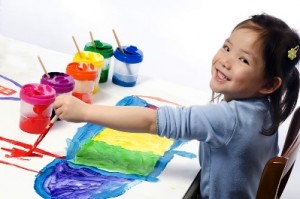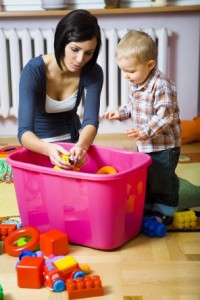Having a child begin preschool for the first time can be a scary prospect. Especially if you are relatively new to the parenting world, you may be getting a bit nervous as August approaches, wondering how to prepare your child for preschool. The good news is that many kids adapt quite easily to a school environment – they love getting outside the house to play with other children and truly enjoy the learning process. Some kids may take longer to come out of their shells, but in the end most children wind up their first year of preschool with several more playmates, a healthy sense of independence, and a serious crush on their teachers. That said, changing from home to the structured atmosphere of a preschool will be hard for both you and your child at first. Simply knowing how to prepare your child for preschool can help you avoid tears and fights and encourage a smooth, pleasant period of transition.

You Are Your Child’s First Teacher: Remember this! A child’s success in the school environment is irrevocably entwined with the amount of support and education they are receiving at home. A child raised in a loving environment is more likely to adapt easily to new situations, respect teachers and peers, and open themselves up to learning. Your baby’s preschool teacher will impart important information and broaden his mind, but in the end, it is you he is watching most closely. Parents are setting the example he will follow. If you show enthusiasm for reading, he will too. If you take advantage of everyday opportunities to learn new things, he or she will also develop a healthy, lifelong curiosity that will serve him well throughout his academic journey.
Preschool Activities: If you are concerned about your child’s academic readiness for preschool, there are several fun, at-home ways you can familiarize them with a preschool curriculum.
- Buy some index cards and write an alphabet letter on each one. Make a game out of identifying the letters. Do the same with
 numbers 1-20.
numbers 1-20. - Make sure she’s comfortable using crayons and paint. Coloring books can be great, but try to also encourage free expression and creativity when she’s drawing or (more realistically) scribbling.
- Music is a huge part of any preschool program. Practice at home with a few musical children’s games.
- There are so many ways to make a game out of basic educational material. Prepare your child to learn and interact at preschool with some fun, educational entertainment right in your own backyard!
- You can prep your child any time, any place. Play some car games during your daily errands. Games like 20 questions or I-Spy help children conceptualize and think creatively – skills they will need for preschool and the rest of their academic journey.
Helping Your Child Focus: If your child has is not already accustom to a daycare or a Sunday-school environment, she may not understand what is required of her in a classroom setting. Most preschools are pretty aware of their students’ limitations and incorporate a lot of downtime and free play. However, for a good portion of the school day your child will have to sit still and pay attention. Talk about this expectation before the first day. Explain what it means to listen to the teacher and classmates respectfully. You may have to give a refresher course every morning, but that’s only natural. Children are not mind-readers. They will learn appropriate behavior only if they are taught and reminded. Keep in mind that three, four, and five year-olds are still quite immature, and they physically cannot concentrate on one subject for long periods of time. Try not to lose heart or get frustrated if your little angel would rather run around in circles than sit in circle time. When given clear, consistent boundaries, he or she will learn to settle down.
understand what is required of her in a classroom setting. Most preschools are pretty aware of their students’ limitations and incorporate a lot of downtime and free play. However, for a good portion of the school day your child will have to sit still and pay attention. Talk about this expectation before the first day. Explain what it means to listen to the teacher and classmates respectfully. You may have to give a refresher course every morning, but that’s only natural. Children are not mind-readers. They will learn appropriate behavior only if they are taught and reminded. Keep in mind that three, four, and five year-olds are still quite immature, and they physically cannot concentrate on one subject for long periods of time. Try not to lose heart or get frustrated if your little angel would rather run around in circles than sit in circle time. When given clear, consistent boundaries, he or she will learn to settle down.
It’s hard sometimes as a parent to know if you’re doing enough to help your child. No one wants their kids to be caught off guard by what they must face in life, but the fact remains that you cannot keep them by your side forever. You understand now how to prepare your child for preschool, and that’s really all you can do for the moment. Be sure to ease your child into school with some fun activities and good pep-talks. But remember, it is setting a good example for your little ones – daily celebrating your own love of learning – that will best equip your little munchkin for a successful academic career. No amount of flashcard training will ever trump the security and self-confidence a child can get from loving parents.


Speak Your Mind